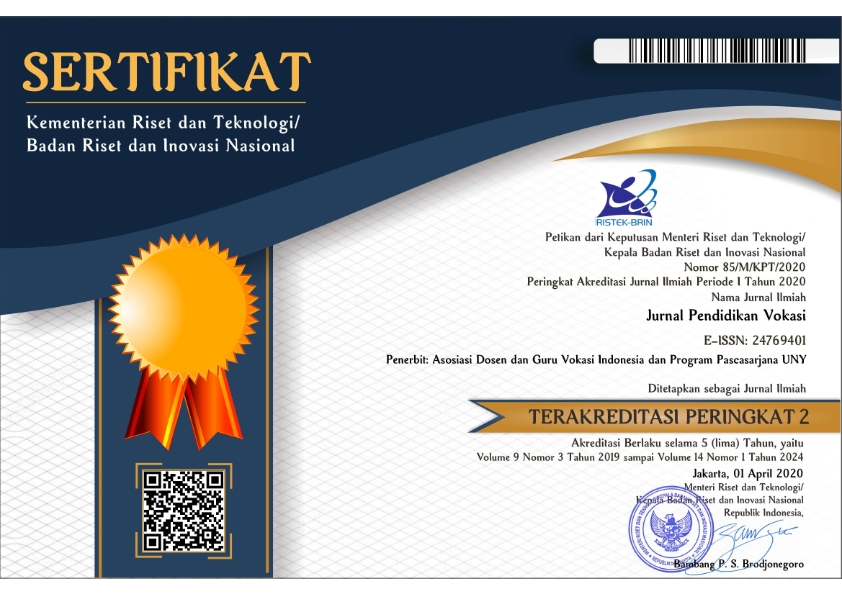Enhancing students’ self-efficacy and creativity in computer numerical control machining through peer-assisted project-based learning
Bayu Rahmat Setiadi, Universitas Negeri Yogyakarta, Indonesia
Irdayanti Mat Nashir, Universitas Pendidikan Sultan Idris, Malaysia
Virda Hersy Lutviana Saputri, Universitas Negeri Yogyakarta, Indonesia
Achmad Arifin, Universitas Negeri Yogyakarta, Indonesia
Tri Adi Prasetya, Universitas Negeri Yogyakarta, Indonesia
Chrisna Tri Harjanto, Universitas Negeri Yogyakarta, Indonesia
Beni Tri Sasongko, Universitas Negeri Yogyakarta, Indonesia
Abstract
Keywords
Full Text:
PDFReferences
Arikunto, S., Saputra, W. N. E., Khoirunnisa, D. A., & Sawai, R. P. (2023). Development and validation of teacher competency perception scale in Indonesia: The RASCH analysis. Journal of Professional Teacher Education, 1(1), 11–21. https://doi.org/10.12928/jprotect.v1i1.491
Beneroso, D., & Robinson, J. (2022). Online project-based learning in engineering design: Supporting the acquisition of design skills. Education for Chemical Engineers, 38, 38–47. https://doi.org/10.1016/j.ece.2021.09.002
Bone, K., Bone, J., Grieshaber, S., & Quinones, G. (2019). A Peer Assisted Learning (PAL) approach to pre-service teacher professional experiences in Australia: Organisational friendships. Asia-Pacific Journal of Teacher Education, 47(4), 347–360. https://doi.org/10.1080/1359866X.2018.1539215
Buana, R. T., & Putra, A. K. (2023). Peningkatan kemampuan berpikir spasial: Implementasi model problem based learning melalui pendekatan self efficacy berbantuan WebGIS Inarisk. Journal of Education Action Research, 7(3), 310–319. https://doi.org/10.23887/jear.v7i3.63881
But, A., Canarache, R., & Gal, L. (2021). Improve productivity through digital manufacturing. Journal of Production Engineering, 24(2), 35–37. https://doi.org/10.24867/JPE-2021-02-035
Chen, X., Wang, Z., & Yang, S. (2022). Research on information security protection of industrial internet oriented CNC system. 2022 IEEE 6th Information Technology and Mechatronics Engineering Conference (ITOEC), 1818–1822. https://doi.org/10.1109/ITOEC53115.2022.9734588
Dai, Y., Tao, X., Li, Z., Zhan, S., Li, Y., & Gao, Y. (2022). A review of key technologies for high-speed motorized spindles of CNC machine tools. Machines, 10(2), 145. https://doi.org/10.3390/machines10020145
Denzin, N. K., & Lincoln, Y. S. (2008). Introduction: The discipline and practice of qualitative research. In Strategies of qualitative inquiry, 3rd ed. (pp. 1–43). Sage Publications, Inc.
Dowluru, S., Bammidi, R., Srinivasa Rao, P., Tavitiraju, K., Manisankar, N., & Sunil Kumar, B. (2022). A frame work for seamless integration of design and manufacturing using CNC. International Journal of Engineering Applied Sciences and Technology, 7(3), 277–282. https://doi.org/10.33564/IJEAST.2022.v07i03.039
Dunlap, J. C. (2005). Problem-based learning and self-efficacy: How a capstone course prepares students for a profession. Educational Technology Research and Development, 53(1), 65–83. https://doi.org/10.1007/BF02504858
Duran, D., & Miquel, E. (2019). Preparing teachers for collaborative classrooms. In Oxford Research Encyclopedia of Education. Oxford University Press. https://doi.org/10.1093/acrefore/9780190264093.013.780
Guo, P., Saab, N., Post, L. S., & Admiraal, W. (2020). A review of project-based learning in higher education: Student outcomes and measures. International Journal of Educational Research, 102, 101586. https://doi.org/10.1016/j.ijer.2020.101586
Huo, F., & Poo, A.-N. (2013). Precision contouring control of machine tools. The International Journal of Advanced Manufacturing Technology, 64(1–4), 319–333. https://doi.org/10.1007/s00170-012-4015-5
Jang, S. (2022). Case analysis of overseas countries in project-based learning for vocational education and workforce development. International Journal of Emerging Technology and Advanced Engineering, 12(4), 78–85. https://doi.org/10.46338/ijetae0422_11
Jeanneau, C., & O’Riordan, S. (2020). The impact of a peer-facilitated discussion initiative on international students’ learning experience in the context of internationalisation at home. Language Learning in Higher Education, 10(1), 1–24. https://doi.org/10.1515/cercles-2020-2011
Jing, Z., Turi, J. A., Lu, S., & Rosak-Szyrocka, J. (2023). Sustainability through factory-based learning in higher education. Sustainability, 15(6), 5376. https://doi.org/10.3390/su15065376
Jones, B. (2019). Good practice: Scaffolded, collaborative project-based learning. Journal of the European Honors Council, 3(1), 1–16. https://doi.org/10.31378/jehc.85
Kakde, P. (2022). CoDevelop: A project collaboration tool to achieve project based learning. International Journal for Research in Applied Science and Engineering Technology, 10(5), 4886–4889. https://doi.org/10.22214/ijraset.2022.43317
Kemmis, S., McTaggart, R., & Nixon, R. (2014). The action research planner. Springer Singapore. https://doi.org/10.1007/978-981-4560-67-2
Khalique, S., & Singh, M. K. (2019). Role of self efficacy in improving employees performance. International Journal of Engineering Research & Technology, 7(12). https://www.ijert.org/role-of-self-efficacy-in-improving-employees-performance
Khamidulin, V. S. (2020). Project-based technologies at the university: Experience and problems. The Humanities And Social Studies In The Far East, 17(2), 125–132. https://doi.org/10.31079/1992-2868-2020-17-2-125-132
Kim, Y. (2021). Effect of projet-based learning on the creative personality, teamwork competence and self-regulated efficacy of undergraduate nursing students. Turkish Journal of Computer and Mathematics Education (Turcomat), 12(10), 872–881. https://turcomat.org/index.php/turkbilmat/article/view/4263
Knight, J. K., & Brame, C. J. (2018). Peer instruction. CBE—Life Sciences Education, 17(2), fe5. https://doi.org/10.1187/cbe.18-02-0025
Kodden, B. (2020). The impact of self-efficacy. In The Art of Sustainable Performance: A Model for Recruiting, Selection, and Professional Development (pp. 31–38). Springer. https://doi.org/10.1007/978-3-030-46463-9_5
Konaszewski, K., Kolemba, M., & Niesiobędzka, M. (2021). Resilience, sense of coherence and self-efficacy as predictors of stress coping style among university students. Current Psychology, 40(8), 4052–4062. https://doi.org/10.1007/s12144-019-00363-1
Li, N., Lim, E. G., Leach, M., Zhang, X., & Song, P. (2022). Role of perceived self-efficacy in automated project allocation: Measuring university students’ perceptions of justice in interdisciplinary project-based learning. Computers in Human Behavior, 136, 107381. https://doi.org/10.1016/j.chb.2022.107381
Loda, T., Erschens, R., Nikendei, C., Zipfel, S., & Herrmann-Werner, A. (2020). Qualitative analysis of cognitive and social congruence in peer-assisted learning – The perspectives of medical students, student tutors and lecturers. Medical Education Online, 25(1). https://doi.org/10.1080/10872981.2020.1801306
Napitupulu, N. D. (2022). The urgency of the multi-model approach in learning environmental physics to achieve learning goals. World Journal of Advanced Research and Reviews, 13(3), 431–437. https://doi.org/10.30574/wjarr.2022.13.3.0247
Ortiz, E. K., Rojas-Mora, J., Herrera Gamboa, O. A., & Gatica, A. M. (2019). Peer learning as a competences integration strategy: An ICT based approach. 2019 38th International Conference of the Chilean Computer Science Society (SCCC), 1–7. https://doi.org/10.1109/SCCC49216.2019.8966413
Pramanik, A., Islam, M. N., Basak, A. K., & Dong, Y. (2019). Learning enhancement of project-based unit in mechanical engineering undergraduate course. In Manufacturing Engineering Education (pp. 73–84). Elsevier. https://doi.org/10.1016/B978-0-08-101247-5.00003-4
Pramatarova, S. (2021). Project-based learning and design thinking. Education and Technologies Journal, 12(2), 359–361. https://doi.org/10.26883/2010.212.3472
Shanava, I., & Gergauli, G. (2022). A study of the relationship between locus of control and self-monitoring to resilience in students. European Scientific Journal ESJ, 9, 612–623. https://doi.org/10.19044/esipreprint.9.2022.p612
Tullis, J. G., & Goldstone, R. L. (2020). Why does peer instruction benefit student learning? Cognitive Research: Principles and Implications, 5(1), 15. https://doi.org/10.1186/s41235-020-00218-5
Venugopal, A., Singh, R., & Devika. (2020). Role of self-efficacy in the learning output of engineering education. In Enhancing future skills and entrepreneurship: 3rd Indo-German Conference on Sustainability in Engineering (pp. 233–242). Springer. https://doi.org/10.1007/978-3-030-44248-4_23
Vinod, B., Gurusamy, G., & Sasikumar, C. (2006). Design and analysis of power failure detector module for control of axis runaway in CNC machines during unprecedented power failures. International Journal of Machine Tools and Manufacture, 46(12–13), 1610–1616. https://doi.org/10.1016/j.ijmachtools.2005.09.008
Voronova, Y. (2021). Project as a method of teaching in higher education. Bulletin of Kharkov National Automobile and Highway University, 94, 215. https://doi.org/10.30977/BUL.2219-5548.2021.94.0.215
Wibowo, W. A., Bagaswara, T., & Nurhadi, H. (2017). Prototyping a beneficial PC-based woodworking CNC machine WCM500 for creative industries. 2017 International Conference on Advanced Mechatronics, Intelligent Manufacture, and Industrial Automation (ICAMIMIA), 300–305. https://doi.org/10.1109/ICAMIMIA.2017.8387606
Wijarwanto, F., & Wijanarka, B. S. (2019). Employability skills of vocational high school expertise mechanical engineering at Surakarta City. American Journal of Educational Research, 7(11), 800–805. https://doi.org/10.12691/education-7-11-7
Zeng, H. (2020). Research on development and application of mechanical engineering based on CNC machining technology. Journal of Physics: Conference Series, 1607(1), 012023. https://doi.org/10.1088/1742-6596/1607/1/012023
DOI: https://doi.org/10.21831/jpv.v14i2.72409
Refbacks
- There are currently no refbacks.

This work is licensed under a Creative Commons Attribution-ShareAlike 4.0 International License.
Our journal indexed by:
















